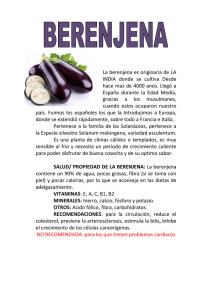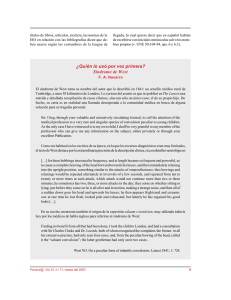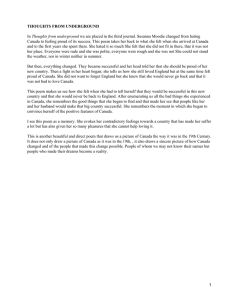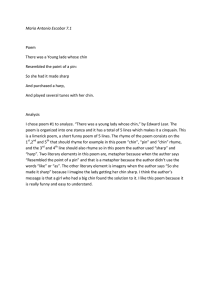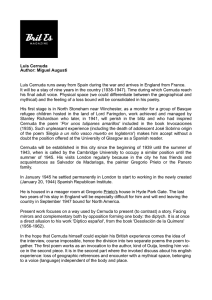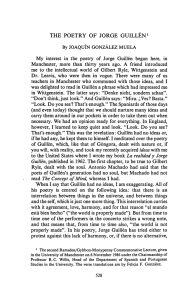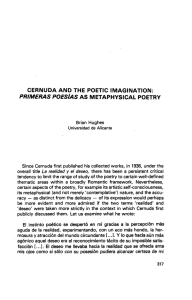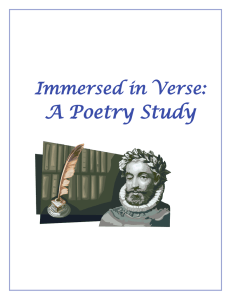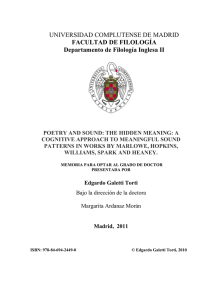A Secret Poem for You - California Institute of Integral Studies
Anuncio
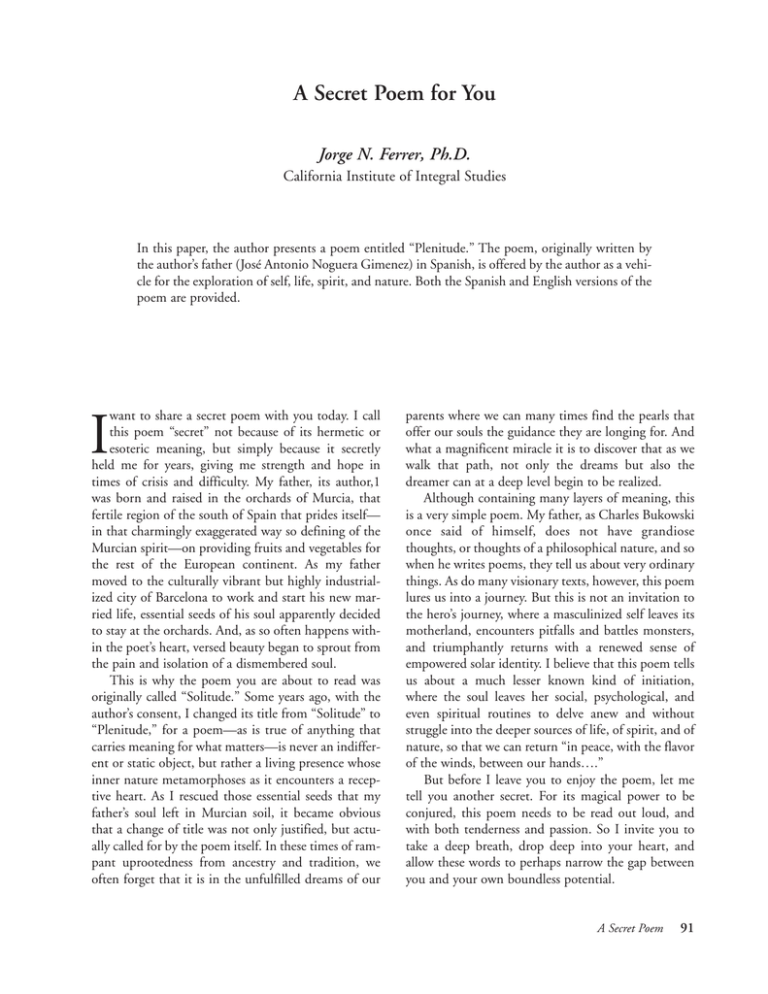
A Secret Poem for You Jorge N. Ferrer, Ph.D. California Institute of Integral Studies In this paper, the author presents a poem entitled “Plenitude.” The poem, originally written by the author’s father (José Antonio Noguera Gimenez) in Spanish, is offered by the author as a vehicle for the exploration of self, life, spirit, and nature. Both the Spanish and English versions of the poem are provided. want to share a secret poem with you today. I call this poem “secret” not because of its hermetic or esoteric meaning, but simply because it secretly held me for years, giving me strength and hope in times of crisis and difficulty. My father, its author,1 was born and raised in the orchards of Murcia, that fertile region of the south of Spain that prides itself— in that charmingly exaggerated way so defining of the Murcian spirit—on providing fruits and vegetables for the rest of the European continent. As my father moved to the culturally vibrant but highly industrialized city of Barcelona to work and start his new married life, essential seeds of his soul apparently decided to stay at the orchards. And, as so often happens within the poet’s heart, versed beauty began to sprout from the pain and isolation of a dismembered soul. This is why the poem you are about to read was originally called “Solitude.” Some years ago, with the author’s consent, I changed its title from “Solitude” to “Plenitude,” for a poem—as is true of anything that carries meaning for what matters—is never an indifferent or static object, but rather a living presence whose inner nature metamorphoses as it encounters a receptive heart. As I rescued those essential seeds that my father’s soul left in Murcian soil, it became obvious that a change of title was not only justified, but actually called for by the poem itself. In these times of rampant uprootedness from ancestry and tradition, we often forget that it is in the unfulfilled dreams of our I parents where we can many times find the pearls that offer our souls the guidance they are longing for. And what a magnificent miracle it is to discover that as we walk that path, not only the dreams but also the dreamer can at a deep level begin to be realized. Although containing many layers of meaning, this is a very simple poem. My father, as Charles Bukowski once said of himself, does not have grandiose thoughts, or thoughts of a philosophical nature, and so when he writes poems, they tell us about very ordinary things. As do many visionary texts, however, this poem lures us into a journey. But this is not an invitation to the hero’s journey, where a masculinized self leaves its motherland, encounters pitfalls and battles monsters, and triumphantly returns with a renewed sense of empowered solar identity. I believe that this poem tells us about a much lesser known kind of initiation, where the soul leaves her social, psychological, and even spiritual routines to delve anew and without struggle into the deeper sources of life, of spirit, and of nature, so that we can return “in peace, with the flavor of the winds, between our hands….” But before I leave you to enjoy the poem, let me tell you another secret. For its magical power to be conjured, this poem needs to be read out loud, and with both tenderness and passion. So I invite you to take a deep breath, drop deep into your heart, and allow these words to perhaps narrow the gap between you and your own boundless potential. A Secret Poem 91 Plenitud Si un día no me encuentras no pienses que me he vuelto loco sino cuerdo. Búscame lejos… donde los hombres vuelan como pajaros sobre los valles inmensos, donde los tristes escarabajos bañan su cuerpo de rocío y se visten de terciopelo negro. Búscame lejos… donce las vacas dan leche a cantaros y lánguidas ovejas se agrupan como nubes blancas, donce los bueyes te miran con ternura y los caballos de cola pacifica sienten la caricia del viento, donde mi frente descanse sin reloj que mida el tiempo — montaña arriba — hacia la luz y el silencio. Oiré la voz que viene de lejos del campesino que canta coplas de amor a su amada, y las campanas de bronce que suenan en el lejano pueblo, oiré la voz de los árboles, de la brisa y del agua… Estrenaré ojos nuevos para mirar a mis anchas donde cantan los grillos, donde duermen las cigarras… …Y cuando tú me encuentres, besaré tu aliento con más calor humano, y te contaré lo que me ha enseñado, el viento, el día, la noche, la luz y las estrellas…, y aprenderemos juntos de una vez para siempre a vivir en paz con el sabor de los aires entre nuestras manos… Allí me encontrarás… tendido en la yerba con la flor de tomillo entre labios, mirando al condor y a las aguilas reales volar… y volar… Allí me encontrarás… aprendiendo a vivir de los insectos y de las aves silvestres, de los animales domésticos, aprendiendo de los pajaros… (¡No me da vergüenza…!) Y puede que hasta aprenda el cuelo de las abejas, a dormir con las gallinas y a conversar con lagartos… y respiraré libre, al viento, por los picos mas altos. 92 The International Journal of Transpersonal Studies, 2004, Volume 23 Plenitude If one day you cannot find me do not think that I have gone crazy, but sane. Look for me far away… where men fly like birds over immense valleys, where the sad beetles bathe their bodies in dew and clothe themselves in black velvet. Look for me far away… where the cows give milk in abundance and the languid sheep gather like white clouds, where the oxen gaze with gentleness, and the horses with peaceful tails feel the caressing of the wind, where I lay my head down without a watch measuring the time — up the mountain — towards the light, and the silence. I will listen for the voice from afar of the countryman who sings love songs to his beloved, and the bronze bells sounding in the far village, I will listen to the voice of the trees, of the breeze, and of the water. I will use my new eyes for the first time to look as far as my gaze roams where the crickets sing, where the cicadas sleep… …And when you find me, I will kiss your breath with human warmth, and I will tell you what they have taught me, the wind, the day, the night, the light, and the stars…, and we will learn together for all time to live in peace with the flavor of the winds between our hands… There you will find me… lying in the grass with thyme blossoms between my lips, gazing at the condor and at the royal eagles flying… and flying… There you will find me… learning to live from the insects and from the wild birds, from the domestic animals, learning from the birds… (I do not feel ashamed…!) And it may be that I even learn to fly like the bees, to sleep with the hens and to converse with the lizards… and I will breathe freely, against the wind, through the highest peaks. End Note The poem’s author, José Antonio Noguera Gimenez, is a retired Spanish artist and poet based in Torrevieja, Spain. Correspondence regarding this article should be directed to the author at [email protected]. A Secret Poem 93
